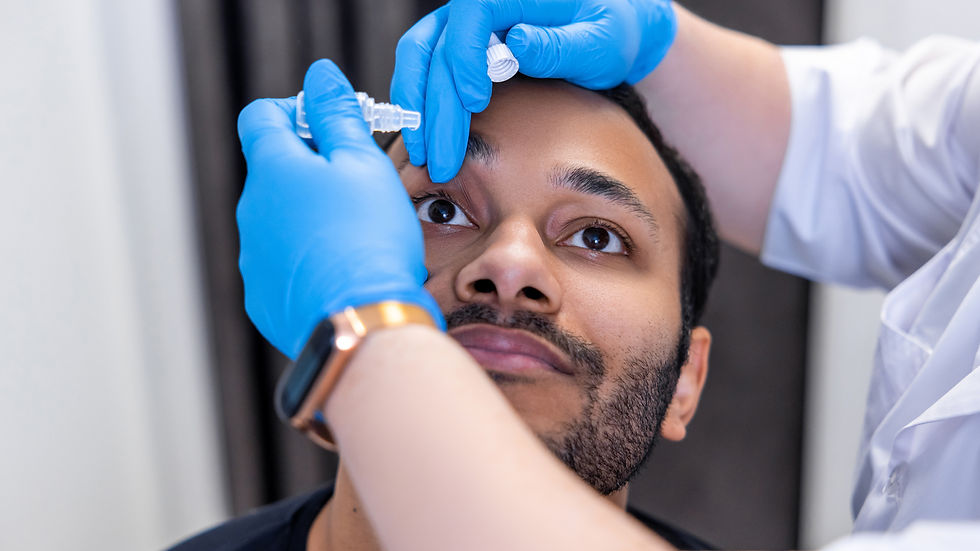Allergic Conjunctivitis: Eye Symptoms, Treatment & Remedies
- Victoria Wermers, RN,MSN,FNP, PMHNP
- Sep 18, 2024
- 3 min read
Updated: Jul 12, 2025
Allergies cause allergic conjunctivitis (allergic "pink eye"). This can be ongoing, caused by continuous exposure to something in your environment, or it can be short-term, like seasonal allergies to things like pollen, molds, ragweed, or grasses during the summer and, especially, in the spring and fall. If you or someone you know experiences watery eyes and a runny nose around the same time every year, it’s likely due to seasonal allergies.. "I never had allergies before..."You can develop them even if you have never had allergies before.
Allergic conjunctivitis is usually recognized by itchy, watery, and often "pinkish eyes." It almost always starts as bilateral—that is, it occurs in both eyes and can become severe. Occasionally, there is swelling of the eyelids and redness of the sclera (whites of the eyes). It may be accompanied by a runny nose and sneezing.
Allergic conjunctivitis is not contagious, and treatment is relatively simple unless it is severe. Very occasionally, a bacterial infection can arise from itching and the introduction of bacteria. So you have to watch for that.

Allergic Conjunctivitis: Eye Symptoms, Treatment & Remedies: Treatment
Over-the-Counter Treatment of Allergic Conjunctivitis
Like so many other over-the-counter medicines, eye drops have many different brands that do similar things. Oral medications and various eye drops may help to treat allergic conjunctivitis including oral antihistamines, antihistamine drops, and mast cell stabilizers (eye drops). Those with decongestants tend to relieve the redness and swelling; those with antihistamines tend to reduce itchiness. Below are just a few of the more common brands.
Eye Drops
These help to sooth eyes and decrease irritation and itchiness
Antihistamine and decongestant (pheniramine and naphazoline respectively) -Naphazoline helps with symptoms of eye redness, and swelling; pheniramine helps reduce itchiness and redness.
-Naphcon-A
-Opcon-A
Antihistamine and decongestant - The antihistamine reduce the symptoms of eye allergy like itching and the decongestant decreases redness and swelling. Often, the actions of these components overlap.
-Visine Allergy Eye Relief
Antihistamine and Mast Cell Stabilizer - Helps reduce the allergic inflammatory response that causes itching, watering and redness of eyes.
-Clear Eyes Once Daily Eye Allergy Relief
-Zatador - Pharmacists recommend this a lot
Oral (Antihistamines)
Cetirizine (Zyrtec)
Loratadine (Claritin)
Fexofenadine (Allegra)
Diphenhydramine (Benadryl)
If your eyes continue to bother you, think about using artificial tears as well as the oral antihistamine.
Many of the brand names are expensive. If you check the different ingredients of over-the-counter "allergy eye drops" (generics are in parentheses above), you may be able to find a less expensive generic.
Nasal Sprays
Nasal Steroids (common: fluticasone/Flonase , claims to help with allergic eye symptoms (the nose and eyes are essentially connected)
Natural Remedies for Allergic Conjunctivitis
If you have any ragweed or plant allergies, be cautious of these herbal remedies.
Goldenseal - Possibly help calm inflammation caused by eye allergy in allergic conjunctivitis
Chamomile may help decrease some irritation of the eyes. Easy to use teabags on closed lids for 15 minutes to 1/2 hour 2-3 times per day/
Neem-Application of Neem around the eye may help (diluted in carrier oil)
Tulsi (Holy Basil) Diluted tea may help as an eyewash. Alternatively, Tulsi Tea bags on the outer lids may help.
Many others may help, and various articles mention them. Few evidence-based studies exist on the efficacy and safety of these approaches; however, many articles mention their benefits.
If you try one of these approaches and have any problems, stop using the substance and consider more traditional measures.
Prescriptive Treatment for Allergic Conjunctivitis
Eye Drops
Antihistamine
Patanase (same as OTC)
Optivar
Astelin (azelastine)
Mast cell stabilizers
Cromolyn
Anti-inflammatories
NSAID (non-steroidal anti-inflammatory) eye drops for inflammation
Ketorolac
In severe cases, steroid eye drops may be prescribed, but these can be dangerous if given to someone afflicted by certain viral eye infections .
Allergic Conjunctivitis: Eye Symptoms, Treatment & Remedies (above) mentions many possible approaches. If you continue to have eye irritation after attempting to manage it or if your symptoms worsen, be sure to follow up with your healthcare provider or eye doctor (optometrist or ophthalmologist).



